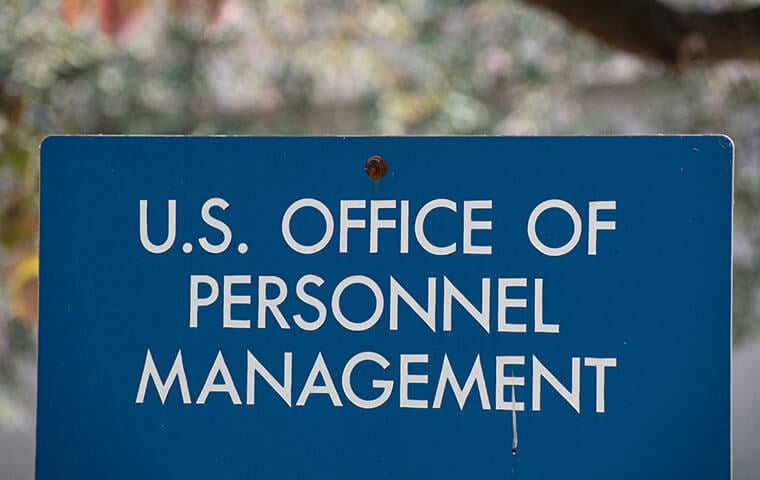 Among other changes, the initiative increases the involvement of “agency leadership—presumably, in most cases political appointees—or their designees, throughout the hiring process. Image: Douglas Rissing
By: FEDweek Staff
Among other changes, the initiative increases the involvement of “agency leadership—presumably, in most cases political appointees—or their designees, throughout the hiring process. Image: Douglas Rissing
By: FEDweek StaffOPM has said that new essay questions to be added to most federal job applications under a Trump administration hiring policy directive “must not be used to impose an ideological litmus test on candidates” although they are to be considered by hiring managers and other agency officials involved in a hiring decision.
“The questions give candidates an opportunity to provide additional information about themselves, their background, and dedication to public service, but must not be used as a means of determining whether the candidate fulfills the qualifications of a position. The questions also must not be used to impose an ideological litmus test on candidates,” says guidance to agencies.
The questions are part of a directive to increase the placement of “patriotic Americans” in federal jobs, saying that hiring “too often focuses on elite universities and credentials, instead of merit, practical skill, and commitment to American ideals.”
The guidance addresses four questions to be used in all competitive service job vacancy announcements graded at GS-05 or above except for teachers, wage grade employees, and seasonal workers. “While agencies are encouraged to use these questions for competitive merit promotion hiring (both internal and external), it is not a requirement,” OPM said.
Of the four, the one that has attracted the most attention is this: “How would you help advance the President’s Executive Orders and policy priorities in this role? Identify one or two relevant Executive Orders or policy initiatives that are significant to you, and explain how you would help implement them if hired.”
A top House Democrat decried that as a “blatant loyalty test” to President Trump that is “antithetical to the concept of an expert, nonpartisan civil service” and unions representing federal employees had similar responses. Among other reactions, the group Public Employees for Environmental Reform had asked the Office of Special Counsel to issue an advisory opinion on whether its implementation would constitute a prohibited personnel practice.
The OSC has responded that it does not issue advisory opinions on matters except the Hatch Act but that the OPM guidance “should help prevent agencies from misusing the four questions.” The OSC also said it “will continue to receive and review any complaints raised about the implementation of the Merit Hiring Plan to ensure that no PPPs are committed and that the merit system principles are upheld.”
In its guidance, the OPM said applicants are to be told that answering the questions is voluntary but provides “an opportunity for you to highlight your dedication to public service for the hiring manager and agency leadership.”On the agency side, responses are not to be “scored or rated. Agencies should treat responses to these questions in the same way they would treat the submission of a cover letter,” it says.
However, they are to be “part of an application packet forwarded to the manager and later to agency leadership if the candidate is recommended for selection.”Among other changes, the initiative increases the involvement of “agency leadership—presumably, in most cases political appointees—or their designees, throughout the hiring process.
That is to include “participating in interviews, resume reviews, accomplishment record reviews, and writing sample reviews” and functioning “as a hiring committee in the candidate selection process.”
Ruling on CFPB Job Cuts Could Affect Challenges to Other RIFs and Reorgs
OPM Calls Off Viewpoint Survey; Next Edition to be Revised
Several Federal Agencies Disavow Union Contracts, with More Likely to Follow
See also,
Should I be Shooting for a $1M TSP Balance? Depends…
What to Know About the New Federal Application Process
Attorney Schnitzer:
How to Challenge a Federal Reduction in Force (RIF) in 2025Attorney Schnitzer:
A Pre-RIF Checklist for Every Federal Employee, From a Federal Employment AttorneyTop 10 Provisions in the Big Beautiful Bill of Interest to Federal Employees

